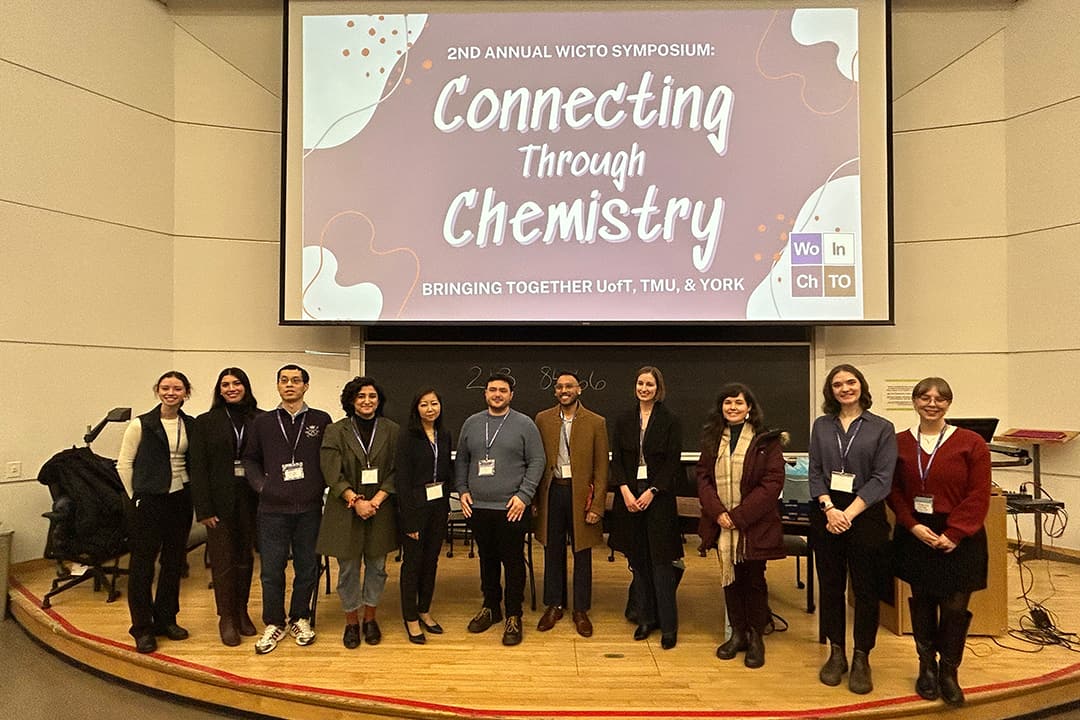On January 27, the U of T organization Working Towards Inclusivity in Chemistry Toronto (WICTO) hosted its second annual Connecting Through Chemistry Symposium, which aims to foster an equitable, diverse, and inclusive environment for chemistry enthusiasts.
The importance of inclusivity and diversity in research
Commanding the stage with presence and confidence, Imogen Coe — a professor of biochemistry at Toronto Metropolitan University (TMU) and an advocate for equity, diversity, and inclusion (EDI) in science — set the tone for the symposium in her keynote lecture. Coe’s speech revolved around how EDI-infused science not only elevates the scientific enterprise but also enhances the capabilities of scientists, ultimately raising the standard for everything and everyone associated with the scientific community.
Coe told the audience that, in our pursuit of unravelling the complexities of science, we are compelled to become conscientious of the relationship between the scientist and the scientific process itself. A critical component of this introspection, she said, involves a thorough examination of scientific literature looking for potential biases that can skew results, which requires a discerning eye to uncover and scrutinize the biases and challenges that may subtly influence the trajectory of scientific progress.
On the topic of bias, Coe relayed that we must scrutinize our reactions to scientific research through the lens of unconscious biases — biases that mostly operate in our subconscious perceptions of people or situations. This term encompasses a spectrum of phenomena, including affinity bias, perception bias, halo effect, and confirmation bias. Affinity bias is the tendency to favour people like us; perception bias means how we can be biased by our pre-existing perceptions of a situation; the halo effect involves conflating a person’s success in one area to unrelated areas or their overall competence; and confirmation bias is being more likely to see conclusions that confirm our preexisting beliefs.
Our cognitive reliance on heuristics to comprehend the world — using mental shortcuts that make use of observed patterns — may paradoxically impede our progress in research, Coe said. When we adhere to the previous status quo in scientific research — notably the predominance of research data from subjects who are all men and white, we perpetuate stagnation rather than fostering evolution.
Embracing change and diversifying perspectives is essential to propel us beyond the confines of the status quo and usher in a more dynamic and inclusive era in scientific exploration. In light of this, Coe posed the essential questions: “Is your research environment inclusive, and therefore excellent? Does your research design prioritize inclusiveness, and [is it] therefore rigorous?”
The alumni panel
After a sequence of illuminating flash talks about students’ research endeavours, coupled with interactive networking and EDI workshops, the focal point shifted toward the eagerly awaited subsequent event: a panel of alumni hailing from U of T, York University, and TMU. This panel, comprising nine chemistry alumni, covered a spectrum of scientific domains, including research and development, business, environmental science and policy, and sports data analysis.
The panel addressed inquiries about each of their professional journeys, providing valuable insights into their roles and experiences. For instance, Yanxin Yang, a U of T alum and data scientist, talked about how analytical skills gained through chemistry can be applied to other fields. He expressed a keen interest in integrating machine learning into his role at Maple Leaf Sports and Entertainment, using statistical techniques to analyze recorded data and generate insights that can influence coaching strategies and decisions related to player development.
In response to a question about advice for their younger selves, Kim Chan, a U of T alum and senior medical science liaison at biotechnology company Amgen, recommended taking a step back, focusing on the bigger picture, and embracing humility and a willingness to learn. Brandon Khan, a synthetic chemist at Dalton Pharma Services with an MSc from York University, stressed the importance of being open and receptive to advice. Melanie Mastronardi, a U of T alum and the vice-president of platform operations at the biotech startup BenchSci, urged the audience not to stress about choosing the perfect job, encouraging exploration and personal growth.
The panellists also reflected on when they realized their current careers were the ones they wanted to pursue. Matthew Gradiski — a U of T alum and an application scientist with Advanced Chemistry Development, Inc., which designs software with a focus on research and development in chemistry — discovered interests in research and development for software and machine learning. Anastassia Pogoutse, working as a strategic research development officer at UTM after graduating from U of T with a PhD, discovered her passion for writing and editing.
When an audience member asked a question about imposter syndrome, it elicited knowing smiles from the panellists, who offered insights and advice on overcoming it. They emphasized the importance of recognizing your strengths and weaknesses and granting yourself a six-to-nine-month grace period in any new job to master your role. Furthermore, many of the panellists stressed the universality of self-doubt and encouraged individuals to be transparent about areas where they may lack knowledge.
The symposium provided profound insights and stimulated contemplation, illuminating facets of chemistry that may transcend traditional laboratory boundaries. It is paramount, both within and beyond the lab, to instigate EDI principles for an inclusive, comprehensive, and optimized environment. This strategic implementation of EDI aims not only to change scientific knowledge, but also to integrate EDI into the minds of students and educators to create fairer labs and classrooms.



No comments to display.